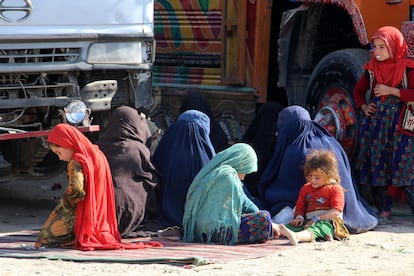As Pakistan cracks down on illegal migrants, nearly half a million Afghans have left, minister says
Pakistan has long hosted about 1.7 million Afghans, most of whom fled during the 1979-1989 Soviet occupation. In addition, more than half a million people arrived when the Taliban seized power in 2021

Nearly half a million Afghans who were living in Pakistan without valid documents have returned home in just over two months as part of an ongoing crackdown on foreigners in the country without papers, the caretaker interior minister said Friday.
The expulsions are part of a nationwide crackdown by the government in Islamabad that started two months ago. Pakistan insists the campaign is not against Afghans specifically, though they make up most of the foreigners in the country.
Pakistan has long hosted about 1.7 million Afghans, most of whom fled during the 1979-1989 Soviet occupation. In addition, more than half a million people fled Afghanistan when the Taliban seized power in August 2021, in the final weeks of U.S. and NATO pullout.
At a news conference in Islamabad on Friday, caretaker Interior Minister Sarfraz Bugti said more than 482,000 Afghans have returned home in the past more than two months, 90% going voluntarily. He said Pakistan has also decided to deport 10 Afghans who were in the country legally but who were taking part in politics.
“Only Pakistani citizens are allowed to engage in political activities in the country. Any foreigner who is found involved in any political activity will be deported immediately,” he said. Bugti did not identify the 10 Afghans who are being deported, nor did he give any details about their activities in Pakistan’s politics.
Bugti said in the ongoing first phase, only undocumented Afghans were being deported but at some point every Afghan refugee would have to go back because Pakistan had already hosted them for up to 40 years.
Most of the Afghans did not try to get Pakistani citizenship, hoping they would not be forced to leave the country. The sudden change in the country’s policy has strained relations with Afghanistan’s Taliban-led administration, which wanted Islamabad to give more time to Afghans, a request that was not accepted by Pakistan.
Bugti’s remarks are likely to cause panic among the nearly 1.4 million Afghans registered as living in Pakistan.
His comments come at a time when U.S. Special Representative for Afghanistan Thomas West is visiting Pakistan. On Thursday, West met with Pakistan’s caretaker Foreign Minister Jalil Abbas Jillani, according to the ministry.
According to Pakistani officials, the two sides discussed a range of issues, including the ongoing drive against undocumented Afghans. The forced expulsion of Afghans without documentation has drawn widespread criticism from human rights activists, U.N. officials and others, who have asked Pakistan to reconsider the policy.
Currently, international aid groups and the U.N. are providing health care and nutrition to those arriving in Afghanistan from Pakistan. The Taliban administration is also providing aid to returnees.
Sign up for our weekly newsletter to get more English-language news coverage from EL PAÍS USA Edition
Tu suscripción se está usando en otro dispositivo
¿Quieres añadir otro usuario a tu suscripción?
Si continúas leyendo en este dispositivo, no se podrá leer en el otro.
FlechaTu suscripción se está usando en otro dispositivo y solo puedes acceder a EL PAÍS desde un dispositivo a la vez.
Si quieres compartir tu cuenta, cambia tu suscripción a la modalidad Premium, así podrás añadir otro usuario. Cada uno accederá con su propia cuenta de email, lo que os permitirá personalizar vuestra experiencia en EL PAÍS.
¿Tienes una suscripción de empresa? Accede aquí para contratar más cuentas.
En el caso de no saber quién está usando tu cuenta, te recomendamos cambiar tu contraseña aquí.
Si decides continuar compartiendo tu cuenta, este mensaje se mostrará en tu dispositivo y en el de la otra persona que está usando tu cuenta de forma indefinida, afectando a tu experiencia de lectura. Puedes consultar aquí los términos y condiciones de la suscripción digital.








































